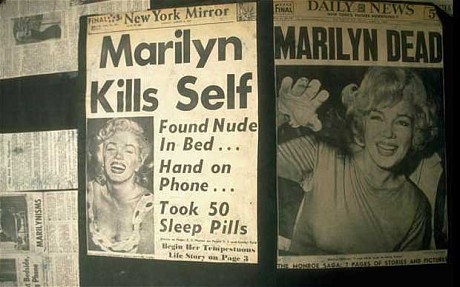
In today’s Telegraph, Gaby Wood takes a critical look at the prurient news coverage of actor Philip Seymour Hoffman‘s death from an alleged heroin overdose last weekend, comparing it to other Hollywood tragedies, including Marilyn’s:
“‘Hollywood has always been like this,’ someone said this week with a shrug, ‘look at Marilyn Monroe.’ It’s true that there have always been scandals. It’s true that the misinformation surrounding Monroe’s death was handled so shabbily, and by so many nefarious parties, that it became another form of assault. But as it happens, the case of Monroe is also instructive, and proof that things were not always this way. Because she was, at the time of her death, the product of the immediate post-studio system.
You might say she was unique: that no one could compete with her as a sex symbol; that the tragedies of her personal life made her especially vulnerable; that had she not been linked to the president the damage limitation would not have been so brutal.
But look at the year she died: 1962. The studios, who had controlled everything, and who had manufactured Marilyn out of Norma Jeane Mortenson, had collapsed at the end of the Fifties. The old orchestrators of official stories had been deposed, and a scene that would once have been carefully re-scripted became a free-for-all.
There were, instantly, lurid reports – even now, 62 years after her death, it remains one of the most raked-over episodes in Hollywood history. The time and cause of death have never been properly proven; her sheets were thought to have been changed before police arrived; autopsy photos were released; several parties claimed to have visited her bedroom and removed evidence.
Her housekeeper, psychiatrist, press agent and lovers were all implicated. And although Monroe wasn’t the first star to have been abandoned by the Hollywood system, she was certainly the biggest.”
However, as Marilyn’s biographer Carl Rollyson has pointed out, both Monroe and Hoffman deserve to be remembered for their immense talent, and not merely their untimely demise:
“I don’t think Marilyn ever did hard drugs, and I don’t think her death has much to tell us about Hoffman’s, except that as performers they were under terrific pressure to always be ‘on.’ Unlike Hoffman, Marilyn was still a contract player, even though she had her own production company, as did Burt Lancaster and others. The point about her is that she is a great transitional figure between the old Hollywood and the new. She was part of an emerging new paradigm that actually began in the late 1940s when the studios were forced by court order to divest themselves of movie theater ownership and, thanks to another lawsuit, the old studio contract that amount to indentured servitude was declared illegal. I think Marilyn’s instincts were right. If only Charlie Feldman (her agent for a while and producer of The Seven Year Itch) had pushed the studios a little harder instead of wanting to play the producer’s game, he might have helped Marilyn more. The other option was if someone had pointed out to Marilyn that she ought to go to Europe. After all, the French and the Italians were giving her awards. Maybe someone did point that out, but I don’t think it was made abundantly clear to her.”